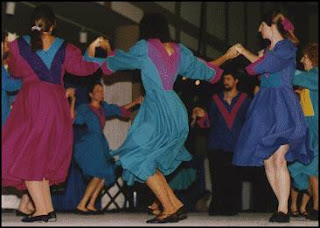
הבה נגילה
הבה נגילה
הבה נגילה ונשמחה
הבה נרננה
הבה נרננה
הבה נרננה ונשמחה
!עורו, עורו אחים
עורו אחים בלב שמח
!עורו אחים, עורו אחים
בלב שמח
Among my earliest memories is of hearing Hava Nagila in the melodious, gravelly voice of Harry Belafonte.
|
Hava Nagila is a Hebrew folk song, the title meaning "Let us rejoice". Though the melody is an ancient one of folk origin, the commonly used lyrics were written by the Jewish Latvian musicologist, Abraham Zevi ldelsohn, in 1918, to celebrate the British victory in Palestine during World War I as well as the Balfour Declaration (on the partitioning of the Ottoman Empire, and British government support for a Jewish national home in Palestine, with the condition that nothing should be done which might prejudice the rights of existing communities there).
Perhaps the non-Jewish musician who did the most to popularise Hava Nagila around the world was Harry Belafonte. In his live performances, he used Hava Nagila as his regular closing number because of its uplifting melody and hopeful, brotherly lyrics. His 1959 Carnegie Hall live concert recording became a best-selling record (and one I grew up hearing).
In transcription:
Hava nagila,
Hava nagila,
Hava nagila ve nismecha.
Hava neranena,
Hava neranena,
Hava neranena ve nismecha.
Uru, uru achim,
Uru achim belev sameach,
Uru achim belev sameach,
Uru achim belev sameach,
Uru achim
Uru achim
Belev sameach.
Here's the translation:
Let's rejoice
Let's rejoice
Let's rejoice and be happy
Let's sing
Let's sing
Let's sing and be happy
Awake, awake, brothers!
Awake, awake, brothers!
Awake brothers with a happy heart
Awake, brothers!
Awake, brothers!
With a happy heart
Here's a video clip of French-Israeli singer Rika Zarai performing Hava Nagila (1959) on French television.

No comments:
Post a Comment